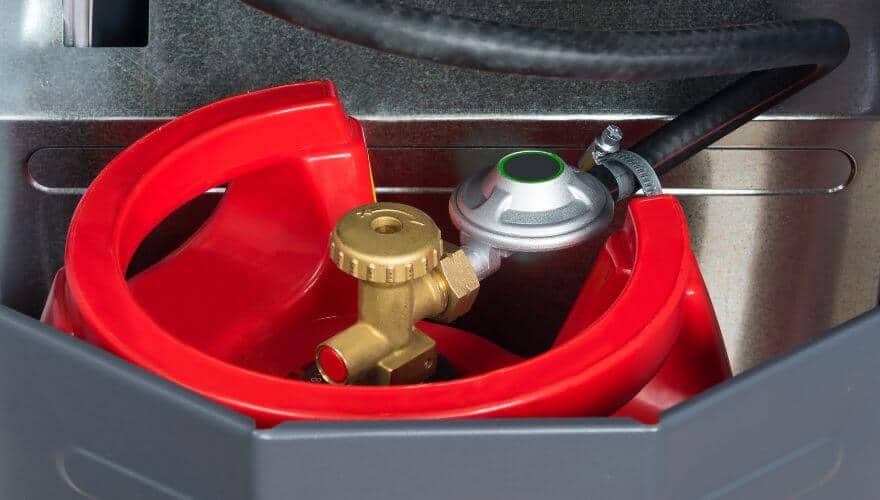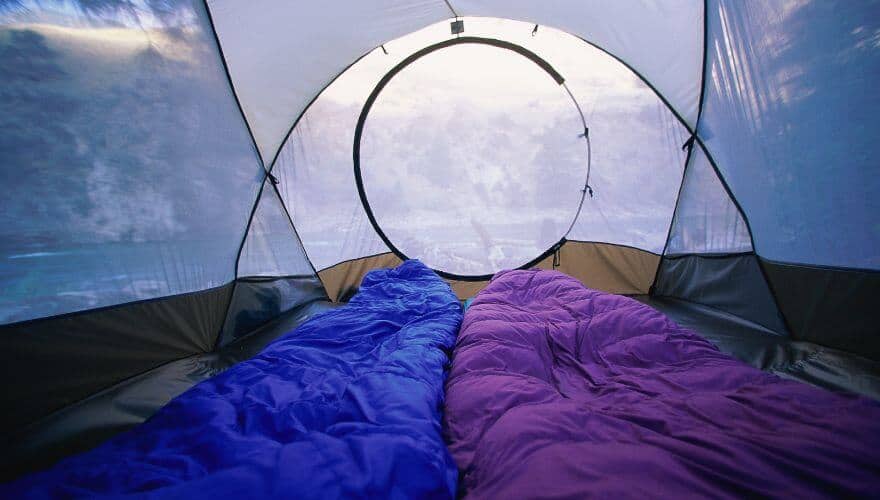Camping in cold weather can be tricky, uncomfortable, and downright dangerous if you’re not prepared. There are quite a few ways to keep yourself toasty warm in your tent on a cold night.
Propane heaters are one of those ways.
I know what you’re thinking: Are propane heaters safe to use in a tent?
Yes, propane heaters are safe to use in a tent as long as they have the proper safety features.
I love going cold weather camping. Because of the chill in the air, I can go on longer hikes, exert more energy during the day, and enjoy a warm stew for dinner.
In the evening, it’s easy to warm up at the campfire and with a hot drink. However, it’s hard to stay warm in the depths of a cold night.
You can use a propane heater at the beginning of each chilly night to get your tent toasty warm. This will keep you comfortable all night. With proper care and use, propane heaters can be really effective.
If you already have a propane heater, ensure that it's up to date with the most current safety features. If it's outdated, you don’t want to use it.
Safe Propane Heaters
Propane heaters come in two styles; the flame is either exposed or enclosed.
Exposed flame heaters are not safe to use in a tent. Only enclosed flame heaters are safe for tent use. Keep in mind that propane heaters are usually meant for use outside.
Camping propane heaters run on one-pound propane cylinders that screw onto the bottom. You can easily find these at any big box store.
The most dangerous aspect of using a propane heater inside is the chance of fire.
Propane heaters cast off an enormous amount of heat – enough so that they can start a fire simply by being near something.
Consequently, even propane heaters labeled as “indoor safe” may still be too powerful for tents.
When looking for a propane heater, you want to see the words “tent safe.” This way, you know that the heater will not produce so much heat that your tent will start on fire.
Think about it this way: Some people use propane heaters to heat their homes when the power goes out in the winter. Inside your tent, do you need a heater powerful enough to heat your home?
No, sir.
Look for heaters that have a max output of around 9,000 BTU. But, really, the lower the BTU, the better.
Also, look closely at the safety features of each heater, and make sure you choose the safest option.
Certainly, the Mr. Heater Buddy and the Mr. Heater Little Buddy are two top-rated options. The Campy Gear Chubby is another great option.
Read also: How to Safely Use Mr. Buddy Heater Inside Your Tent
When purchasing a propane heater, you’ll want to look for:
- Low BTU
- Indoor Safe
- Portable
- Safety Sensors
- Recommended for Tents

What Makes a Propane Heater Safe?
Modern-day propane heaters typically come with standard safety features.
Inspect older model heaters to make sure they check all these boxes. If they don’t, it is time to get a new, safer propane heater.
Automatic shut-offs are a must for propane heaters. Modern-day heaters will automatically shut off if they detect any of the following:
- Carbon monoxide - If the heater detects that the oxygen level is too low and the carbon monoxide level is too high, the heater will shut itself off.
- Tipping - If you knock the heater over or on its side, a tipping sensor will turn off the propane heater.
- Overheating - If the heater gets too hot, it should shut itself off with an overheating sensor.
Your propane heater should also have:
- Automatic timer - This will allow you to set it so that it turns off once you are in a deep sleep.
- Safety guard - A screen must cover the heating element or frame to ensure that the heater does not set you or your gear on fire.
- Push ignition - In the past, propane heaters were lit with a lighter or match. These are not safe to operate inside a tent.
Carbon Monoxide
When it comes to propane heaters in tents, campers dying from carbon monoxide come to mind. Yes, there are cases in which people have died from carbon monoxide poisoning while camping.
However, it's not common, and the number of cases decreases yearly because heaters are becoming safer.
Carbon monoxide (or CO) is an odorless gas produced by the incomplete combustion of fuels. Carbon monoxide poisoning happens when CO molecules displace oxygen in the body.
Essentially, a person breathes in more CO than oxygen from a heating source (gasoline, wood, propane, kerosene, heating oil, etc.).
Most CO deaths occur in residences or motor vehicles. That’s why running your car in a closed garage is not okay. Or, if you’re stuck in your car in a winter storm, you must keep your tailpipe clear of snow.
Symptoms of CO poisoning include:
- Dull headache
- Weakness
- Dizziness
- Nausea or vomiting
- Shortness of breath
- Confusion
- Blurred vision
- Loss of consciousness
From 1990-1994, an annual average of 30 fatal CO poisonings occurred inside tents or campers.
A tent should never be heated by fuel-burning camping gear unless the gear is specifically designed for this purpose.
Do not use equipment like camping stoves, lanterns, and grills inside your tent. Heaters should have safety features designed to meet the needs of tent camping.

Safety Tips for Using a Propane Heater in a Tent
The last thing you want to do is cause a fire at your campsite, mainly because a tent fire can easily set aflame nearby grasses and trees.
Safety is #1 when it comes to all things camping.
Get into the habit of caring for your heater before and during your camping trip. That way, using your heater safely becomes second nature.
Before Your Trip
If the idea of carbon monoxide keeps you up at night, you can purchase an additional carbon monoxide monitor.
I suggest this sensor from Amazon or something similar.
This works just like a carbon monoxide detector in your house. It will sound an alarm, flash, and vibrate at a low level if it senses 35 ppm or a high level of 200 ppm.
Also, check your hoses and connections before your trip.
Make sure all connections are tight and everything is clean on your heater.
During Your Trip
Follow the instructions that came with your propane heater.
To make propane heaters safe, you must follow all the manufacturer's instructions.
Make sure your tent has ventilation.
Most tents do because that’s how tents are built, with ventilation at the top and bottom.
These vents are intended to help keep you cool in the summer but make sure they’re open and clear if you’re using your heater.
Winter tents, especially canvas tents, are sealed better. However, you still want to ensure your vent flaps are open while your heater is on.
Likewise, if snow builds up, make it is not blocking your vent ports.
If your tent does not have vent ports or flaps, leave a window and the front door slightly open to maintain high oxygen levels in the tent.
Never run your propane heater in an enclosed space without ventilation.
Always give your heater lots of space. Heaters should have at least three feet of clearance in all directions.
This is because propane heaters get very hot and can start a fire just by getting something warm enough to ignite.
Don’t place your heater near the walls of your tent. This is similar to giving your heater lots of space. Ideally, your heater should be in the center of the tent with a three-foot clearance all around it.
Your sleeping bags or cots should be along the outer walls of your tent.
Make sure your heater is on a flat surface. One of the biggest dangers of a propane heater is that it will tip over (especially if you don’t have a tip sensor). Make sure your propane heater is on a hard, flat surface.
Keep an eye on it.
Make sure everyone knows the rules about the heater, especially if you are camping with children.
Is It Safe to Sleep with a Heater On?
Sleeping with your propane heater on is not advised.
However, if your propane heater has a timer that will shut off the heater, and if it has a tip-over sensor, you might feel more comfortable falling asleep with your heater on.
To use your heater in the safest way possible, be aware of and watch your heater while it is on.
The good news is that you probably don’t need to keep your heater on all night.
Once the interior of your tent and your gear are warm, you can turn off your heater and close up your tent. This will trap the heat inside your tent for the remainder of the night.
Alternative Heating Sources
Propane heaters are not the only way to get warm on a cold camping trip. There are lots of options to match your comfort level and preferred style of camping.
Ceramic (Electric) Heaters - These heaters are perfect for those who like to camp next to electrical hookups. Ceramic heaters plug in and use two ceramic plates to heat a small area.
Fan (Electric) Heaters - Again, these heaters are great for someone with access to an electric connection. Instead of ceramic plates, fan heaters use a metal coil and fan to heat your tent.
Electric heaters have a few advantages over gas:
- They don’t consume oxygen, which means there is no chance of CO poisoning.
- You don’t have to purchase a propane tank and lug it around while camping
- There’s no chance of a gas-fueled fire if something goes wrong with it.
However, they have some disadvantages:
- You must bring an electrical outlet.
- You must bring a heavy-duty extension cord.
- It is still a fire hazard if the heater tips over or melts gear that is too close.
If you’d like to read more about some of these options and compare them to propane heaters, check out our Best Heaters for Car Camping guide.
Battery Heaters - Battery heaters can be either ceramic or fan-style; they are powered by a battery or battery bank instead of an electric cord.
See our ultimate guide to Battery Powered Tent Heaters if you want to check out this option.
Wood Burning Stove - Wood-burning stoves can be used in tents specifically designed to accommodate one. If you are an avid winter camper, this might be an excellent option.
Backpacking Techniques - Dress in layers, stay dry, use two sleeping pads, keep bottles of hot water in bed, and eat and drink plenty.
Some backpackers also sleep in a balaclava, use a sleeping bag plus a quilt, and exercise during the coldest part of the early morning.
By far, these techniques are the most challenging ways to stay warm.
However, they are used by backpackers who can't take a portable heat source with them.
Final Thoughts
Using a propane heater to heat your tent while cold weather camping is possible, but it is your responsibility to do this safely.
Ensure that your propane heater has the most up-to-date safety features. Be mindful when you use your propane heater to keep yourself and your family safe.
Don’t let the cold weather bum you out or stop you from camping. Propane heaters are safe in tents, and if they encourage you to try cold weather camping, give them a go!
Read also:

Kendall Casey
Kendall is a freelance outdoor adventure writer passionate about educating those who wish to explore the outdoors. When Kendall isn’t writing, she is exploring the woods of the US Northeast on foot or kayak.
